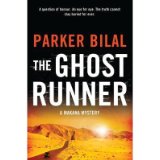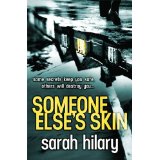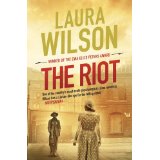 The Ghost Runner by Parker Bilal published by Bloomsbury
The Ghost Runner by Parker Bilal published by Bloomsbury
The Outcast Dead by Elly Griffiths published by Quercus UK, Houghton Mifflin Harcourt US
Someone Else’s Skin by Sarah Hilary published by Headline UK, Penguin US
The Riot by Laura Wilson published by Quercus
If history as it has been taught for generations left out half the human race, and it did, crime fiction is filling the gap. The way some women have had to live, and the torments visited upon them by the more powerful sex, are laid bare in this month’s novels.
Parker Bilal, who also writes as Jamal Mahjoub, sends his private investigator, Makana, from Cairo into the kind of poor, isolated Egyptian village, where honour killings are a common way to avoid the embarrassment of accepting, for example, father-daughter incest. Bilal writes precisely and beautifully about a ‘civilization’ which incorporates such atrocious injustice that almost any kind of revenge is understandable. Makana is a wonderful character, dealing with tragedy of his own and yet capable of humour as well as compassion. The minor characters are well-drawn, in particular his sidekick, Sindbad. This is a fine and involving novel.
The Outcast Dead of Elly Griffiths’s sixth novel are technically the unknown dead of Norwich, ‘the paupers, the plague victims, forgotten, unmourned…’ But they are also those who have died hated. Griffiths’s sleuth is Ruth Galloway, a forensic archaeologist and single mother of Kate, working with DCI  Harry Nelson. He is Kate’s father, but it is understood that he will never leave his wife, Michelle, and their children. While he is investigating a woman suspected of killing her three children, Ruth deals with the skeleton of an executed criminal recently discovered in an archaeological trench. Female and with an iron hand, she is identified as Jemima Green, aka Mother Hook, a notorious baby farmer convicted of child murder in the nineteenth century. Ruth’s investigation of Mother Hook entwines with the modern crimes and childcare issues in a story of great warmth and intelligence.
Harry Nelson. He is Kate’s father, but it is understood that he will never leave his wife, Michelle, and their children. While he is investigating a woman suspected of killing her three children, Ruth deals with the skeleton of an executed criminal recently discovered in an archaeological trench. Female and with an iron hand, she is identified as Jemima Green, aka Mother Hook, a notorious baby farmer convicted of child murder in the nineteenth century. Ruth’s investigation of Mother Hook entwines with the modern crimes and childcare issues in a story of great warmth and intelligence.
Sarah Hilary’s first novel, Someone Else’s Skin, is more immediately horrifying but just as intelligent. Opening in a women’s refuge, it looks with absolute directness at the vile personal cruelty of all domestic violence. One of the residents is Ayana Mirza, whose case picks up the threads of Parker Bilal’s novel and shows that honour violence is not restricted to poor and isolated Egyptian villages. When the CPS need a statement from her, DI Marnie Rome is called in. She is still battling with the aftermath of her parents’ murder by the disturbed young man they chose to foster as her only sibling. Not surprisingly she has issues with trust, and nothing she sees in the refuge encourages her to make herself vulnerable to anyone else. Soon there is an  attempted murder to investigate as well, and a happy ending for any of the characters involved seems unlikely. But Hilary is too sensitive to her readers to leave them quite uncomforted. To me it seems a pity that she felt it necessary to include the cliché of kidnap and torture of one of the investigating officers. This novel is easily powerful enough to grip without such melodrama.
attempted murder to investigate as well, and a happy ending for any of the characters involved seems unlikely. But Hilary is too sensitive to her readers to leave them quite uncomforted. To me it seems a pity that she felt it necessary to include the cliché of kidnap and torture of one of the investigating officers. This novel is easily powerful enough to grip without such melodrama.
The Riot, Laura Wilson’s latest instalment in the saga of DI Stratton’s life and work, looks at the Notting Hill riots of the  1950s. At a time when Ladies Bountiful were still doing most of the social work in the slums of W11, and immigrants from the Caribbean were so shut out from profitable employment and so ripped-off by Rachman-esque landlords that pimping was a more or less rational life choice, Stratton has to deal with the murder of a rent collector. He soon finds himself investigating prostitution, running battles between the new immigrants and the indigenous teddy boys, and another murder, all taking place in the streets and squares where houses now sell for many millions. With her usual impeccable research and elegant prose, Laura Wilson evokes a world that has almost completely gone now and yet still explains much about London sixty years on. Her compassion is not restricted to the young girls who are enticed into prostitution and brutalised by their pimps and customers, but is also given to the men whose own circumstances have turned them into abusers. Her account of their lives makes it absolutely clear that there are generous innocents among the rich and greedy villains among the needy. That much, at least, will never change.
1950s. At a time when Ladies Bountiful were still doing most of the social work in the slums of W11, and immigrants from the Caribbean were so shut out from profitable employment and so ripped-off by Rachman-esque landlords that pimping was a more or less rational life choice, Stratton has to deal with the murder of a rent collector. He soon finds himself investigating prostitution, running battles between the new immigrants and the indigenous teddy boys, and another murder, all taking place in the streets and squares where houses now sell for many millions. With her usual impeccable research and elegant prose, Laura Wilson evokes a world that has almost completely gone now and yet still explains much about London sixty years on. Her compassion is not restricted to the young girls who are enticed into prostitution and brutalised by their pimps and customers, but is also given to the men whose own circumstances have turned them into abusers. Her account of their lives makes it absolutely clear that there are generous innocents among the rich and greedy villains among the needy. That much, at least, will never change.
Post-script One continuing pleasure of 2014 is Penguin’s reissuing of all of Georges Simenon’s Maigret novels. While quite different in tone and length (in modern terms they are novellas) from any of these, they offer real pleasure. Maigret’s unassuageable appetite for heat, beer, sandwiches and bicycling provides amusement and the sparely evocative prose offers a masterclass to anyone planning to write a crime novel.
